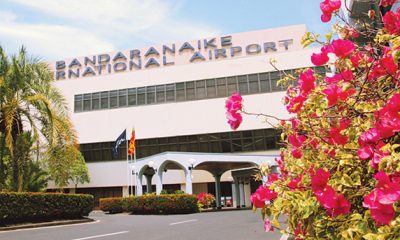Business
Urgent appeal from Sri Lankan exporters on rupee appreciation

As a collective body of exporters, we have been at the forefront of sustaining employment and ensuring a steady flow of foreign exchange, even amidst the most severe economic downturns faced by our nation. Our membership covers the majority of merchandise exports, which account for some 13% of Sri Lanka’s GDP. Today, we stand united in urging the authorities to address the pressing challenges posed by the appreciation of the Sri Lankan rupee (LKR) against the US dollar (USD), further compounded by restrictions on the movement of foreign currency between commercial banks, and the mandatory conversion of export earnings into Sri Lankan rupees, a number of local organizations prominent in the field of exports said in a joint statement.
The organizations concerned are; the Exporters Association of Sri Lanka, National Chamber of Exporters, Sri Lanka Association of Manufacturers and Exporters of Rubber Products, the Joint Apparel Association Forum of Sri Lanka and the Tea Exporters Association.
Extracts from the statement:
‘The appreciating rupee has had a multifaceted negative impact on our business. A stronger rupee means our goods become more expensive for international buyers, directly affecting our competitiveness in the global market. The exchange rate peaked at over Rs. 364 per USD in May 2022, which led to increased operational costs, compelling us to adjust our cost base in line with higher inflation experienced in the country. The rapid appreciation of the rupee, with rates falling below Rs. 300 per USD since March 19th, has placed us in a precarious position, threatening the sustainability of our businesses and the livelihoods of those we employ. Despite the appreciation of the rupee, the cost of living remains high, continuing to level pressure on worker wages.
‘The timing of the rupee’s appreciation coincides with weak global demand for the majority of our merchandise exports and severe competition from competing countries. Factors such as global inflation and geopolitical tensions have continued to affect sentiment and purchasing power in the primary markets of our merchandise exports.
‘The painful economic stabilization process implemented with significant monetary and fiscal policy measures by way of policy rate, inflation, and tax adjustments; import controls; and debt service suspension, has had the desired impact to constrain economic activity and, in turn, adjust and constrain import demand. At the same time the collective efforts of the government, export community, tourism industry and remittances have continued to have a positive inflow and enhance foreign reserve positions to more comfortable levels.
‘This is in the backdrop of the extraordinary circumstances when the debt servicing by the country remains at a standstill, which is a temporary situation.
It is crucial to recognize that the landscape of our foreign exchange reserves has significantly transformed and the continued enforcement of the mandatory conversion policy, considering the current positive reserves, is counterproductive. Persisting with this approach has placed exporters at a market disadvantage and forced them to operate on an unleveled playing field, eroding their competitiveness. It further acts as and is viewed as an anti-export policy measure. Export-led recovery needs to be prioritized to ensure the inflow of vital export earnings and to encourage investments in the future.
‘In light of these considerations, we urgently request the Central Bank to revisit and repeal the aforementioned Gazette, in alignment with the evolving economic context. This appeal is made with a vision towards fostering an environment that not only enables but actively supports the growth and competitiveness of Sri Lanka’s exports. By addressing these policy concerns, we can lay the groundwork for sustainable economic development, secure employment for our citizens, and ensure the continued prosperity of our nation.
‘We invite the government of Sri Lanka to join us in taking decisive action towards these ends. Together, we can chart a course towards a brighter, more resilient future for the Sri Lankan export sector and, by extension, our economy at large.’
Business
CB Governor underscores rating agencies’ critical role in post-debt restructuring recovery

Sri Lanka’s Central Bank Governor, Dr. Nandalal Weerasinghe, has underscored the critical role of sovereign credit rating agencies in helping debt-distressed nations smoothly transition out of default status after successful debt restructuring.
Speaking at the Global Sovereign Debt Roundtable (GSDR) in Washington DC on the sidelines of the IMF and World Bank Spring Meetings, Dr. Weerasinghe shared Sri Lanka’s ongoing debt restructuring experience.
He highlighted that while restructuring is a crucial step toward economic recovery, rating agencies must play a proactive role in reassessing countries’ creditworthiness fairly and promptly once restructuring is completed.
The GSDR, co-chaired by the IMF, World Bank, and G20 Presidency, serves as a key platform for debtor nations and creditors to address debt challenges.
Sri Lanka, a country which has undergone complex debt negotiations, has been an active participant in these discussions.
Governor Weerasinghe’s remarks come at a pivotal time, as Sri Lanka seeks to restore international investor confidence post-restructuring.
His call aligns with broader discussions at the GSDR on improving coordination between debtors, creditors, and financial institutions to ensure sustainable debt solutions, and help restore international investor confidence in countries such as Sri Lanka.
The roundtable also highlighted the newly introduced Sovereign Debt Restructuring Playbook, designed to guide countries through restructuring processes.
The Central Bank’s push for more responsive and supportive rating agency policies could set an important precedent for other debt-distressed economies as well.
Speaking at the GSDR, Treasury Secretary K M M Siriwardana acknowledged the International Monetary Fund (IMF) as instrumental in stabilising Sri Lanka’s crisis-hit economy, as the country prepares to receive its fifth IMF tranche of $344 million in the coming weeks.
Siriwardana reflected on Sri Lanka’s ‘extremely challenging journey’ since its 2022 economic collapse marked by severe shortages, public unrest, and a loss of confidence in governance.
“Seeking IMF support was a strength, not a weakness,” he asserted, crediting the Fund’s policy framework and technical assistance for reversing the economic freefall.
He highlighted over 200 IMF training programmes conducted to strengthen institutional capacity, stating, “The IMF laid the foundation for stability.”
Notably present at the discussion was Peter Brewer, the IMF’s former Senior Mission Chief for Sri Lanka, underscoring the close collaboration between Sri Lanka and the Fund.
Siriwardana traced the roots of the crisis to political instability between 2017–2019, the 2019 Easter attacks, and contentious tax policies, which collectively deepened Sri Lanka’s economic vulnerabilities. “Yet,” he noted, “Difficult reforms are now yielding positive results.”
By Sanath Nanayakkare
Business
Calcey earns ISO 27001 certification, strengthening data security commitment

Calcey, a global software services provider, has achieved ISO 27001:2013 certification, the international benchmark for Information Security Management Systems (ISMS). This certification highlights Calcey’s strong measures in safeguarding client data and managing security risks.
The rigorous audit covered Calcey’s security protocols, risk management, and operational processes across its offices in Singapore, Sri Lanka, and the U.S.
Mangala Karunaratne, CEO of Calcey Technologies, stated that this milestone underscores their dedication to top-tier data security, reinforcing trust among clients in the U.S., Europe, and the Nordic regions.
The certification ensures compliance with global security standards, benefiting Calcey’s diverse clientele, from startups to large enterprises.
Business
Chinese Dragon Café Nuwara Eliya seasonal outlet remains open until April 30

Chinese Dragon Café, a leading Sri Lankan-style Chinese restaurant, has announced that its temporary outlet at Alpine Hotel in Nuwara Eliya will remain open until April 30, catering to both loyal customers and tourists during the Avurudu season.
The seasonal branch has already gained popularity among locals and visitors, offering signature dishes like seafood fried rice, fried noodles, tom yum soup, hot butter cuttlefish, and crispy spring rolls. To enhance convenience, the café provides free delivery within Nuwara Eliya for hotel guests and holidaymakers.
This marks the brand’s first seasonal expansion to Nuwara Eliya, capitalizing on the influx of tourists especially from Colombo, enjoying the cool climate and festive atmosphere.
-

 News6 days ago
News6 days agoOrders under the provisions of the Prevention of Corruptions Act No. 9 of 2023 for concurrence of parliament
-

 Features7 days ago
Features7 days agoRuGoesWild: Taking science into the wild — and into the hearts of Sri Lankans
-

 Business2 days ago
Business2 days agoPick My Pet wins Best Pet Boarding and Grooming Facilitator award
-

 News6 days ago
News6 days agoProf. Rambukwella passes away
-

 Opinion7 days ago
Opinion7 days agoSri Lanka’s Foreign Policy amid Geopolitical Transformations: 1990-2024 – Part IX
-

 News2 days ago
News2 days agoNew Lankan HC to Australia assumes duties
-

 Features2 days ago
Features2 days agoKing Donald and the executive presidency
-

 Business2 days ago
Business2 days agoACHE Honoured as best institute for American-standard education
























